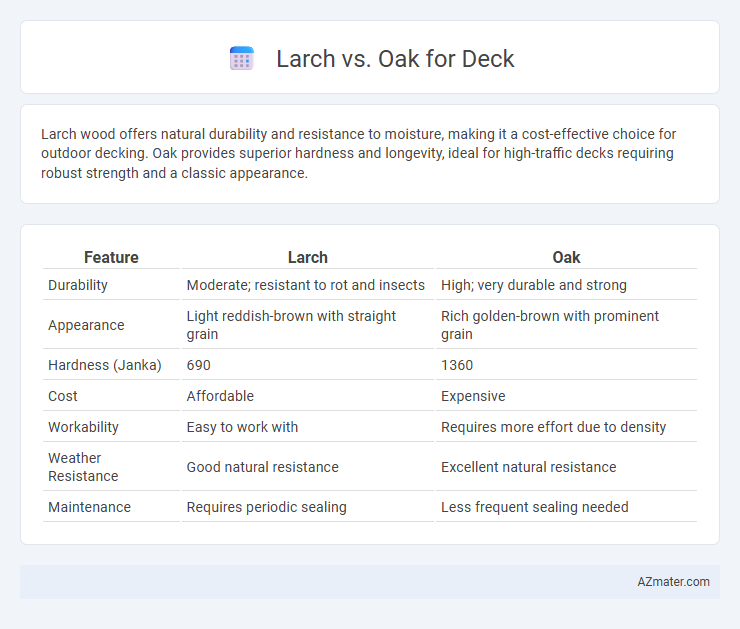Larch wood offers natural durability and resistance to moisture, making it a cost-effective choice for outdoor decking. Oak provides superior hardness and longevity, ideal for high-traffic decks requiring robust strength and a classic appearance.
Table of Comparison
| Feature | Larch | Oak |
|---|---|---|
| Durability | Moderate; resistant to rot and insects | High; very durable and strong |
| Appearance | Light reddish-brown with straight grain | Rich golden-brown with prominent grain |
| Hardness (Janka) | 690 | 1360 |
| Cost | Affordable | Expensive |
| Workability | Easy to work with | Requires more effort due to density |
| Weather Resistance | Good natural resistance | Excellent natural resistance |
| Maintenance | Requires periodic sealing | Less frequent sealing needed |
Introduction: Larch vs Oak for Decking
Larch and oak are both popular hardwood choices for decking due to their durability and aesthetic appeal. Larch offers natural resistance to decay and moisture, making it suitable for outdoor environments, while oak provides exceptional strength and a classic appearance with its fine grain. When choosing between larch and oak for decking, consider factors such as maintenance requirements, weather resistance, and the desired look for long-lasting performance.
Durability Comparison: Larch and Oak Deck Boards
Larch deck boards offer strong natural durability due to their high resin content, making them resistant to rot and insect damage, particularly in outdoor environments. Oak deck boards, especially white oak, provide exceptional hardness and density, enhancing their resistance to wear and decay, though they may require more maintenance to preserve their longevity. Comparing durability, larch excels in moisture resistance while oak outperforms in mechanical strength, making both suitable for decking depending on specific environmental conditions and maintenance preferences.
Appearance and Aesthetic Differences
Larch wood exhibits a warm reddish-brown hue with a prominent grain pattern that darkens with age, offering a natural rustic charm ideal for traditional or country-style decks. Oak, especially white oak, presents a smooth, consistent texture with a lighter tan to medium brown color, providing a classic and refined aesthetic suited for elegant, contemporary outdoor spaces. The choice between Larch and Oak for decking hinges on the desired visual impact--Larch emphasizes rugged, textured appeal, while Oak delivers a polished, timeless look.
Resistance to Weather and Rot
Larch wood offers superior natural resistance to weather and rot due to its high resin content, making it an ideal choice for decks exposed to moisture and varying climates. Oak, while durable and strong, is more prone to rot and requires thorough treatment to withstand prolonged exposure to weather. Larch's longevity and robust decay resistance ensure a longer-lasting deck with less maintenance compared to untreated oak.
Maintenance Requirements for Each Wood
Larch wood requires regular sealing and oiling every 1-2 years to protect against moisture and UV damage, while oak demands less frequent maintenance but benefits from occasional sealing to prevent cracking and warping. Both woods resist rot well, yet larch's natural resin content provides enhanced durability with minimal upkeep. Oak's dense grain offers strength but requires vigilance against surface weathering to maintain its appearance and longevity on a deck.
Environmental Impact and Sustainability
Larch wood offers a more sustainable option for decking due to its rapid growth rate and ability to thrive in cooler climates, reducing the need for intensive land use and chemical treatments. Oak, while durable and resistant to wear, typically has a longer growth cycle and often comes from forests with slower regeneration rates, increasing its environmental footprint. Choosing larch supports lower carbon emissions and promotes responsible forestry practices, making it a greener choice for eco-conscious decking projects.
Cost Analysis: Larch vs Oak Decking
Larch decking is generally more cost-effective than oak, offering a balance of durability and affordability suitable for budget-conscious projects. Oak decking, while significantly more expensive due to its density and premium appearance, provides superior hardness and longevity. Considering installation and maintenance, larch requires less initial investment but may incur higher long-term costs compared to the more durable oak.
Installation Considerations
Larch offers easier installation due to its lighter weight and natural resistance to decay, reducing the need for extensive pre-treatment or heavy-duty fasteners. Oak, being denser and heavier, requires pre-drilling and more robust fastening systems to prevent splitting and ensure stability during installation. Both woods benefit from proper acclimatization to minimize expansion and contraction, but Larch typically allows for quicker, more straightforward deck construction.
Lifespan and Long-Term Performance
Larch wood offers excellent durability and natural resistance to decay, making it suitable for outdoor decks with an average lifespan of 15 to 25 years when properly maintained. Oak, particularly white oak, provides superior strength and moisture resistance, often lasting 30 years or more in decking applications due to its dense grain and resistance to rot. While both woods perform well, oak generally delivers longer-term durability, but larch is a cost-effective option with commendable longevity for deck construction.
Which is Best for Your Deck: Larch or Oak?
Larch offers excellent durability and natural resistance to rot and insects, making it a cost-effective and sustainable option for outdoor decking. Oak provides superior hardness and strength, resulting in a denser, more wear-resistant surface ideal for high-traffic areas. Choosing between larch and oak depends on prioritizing either larch's weather resistance and affordability or oak's robust durability and classic aesthetic for your deck.

Infographic: Larch vs Oak for Deck
 azmater.com
azmater.com